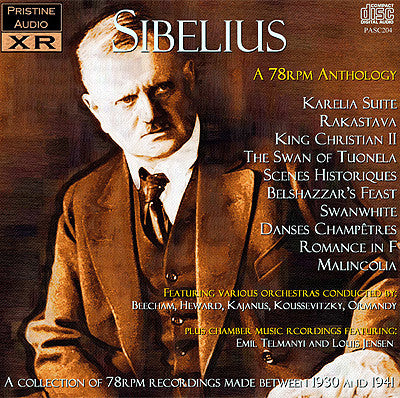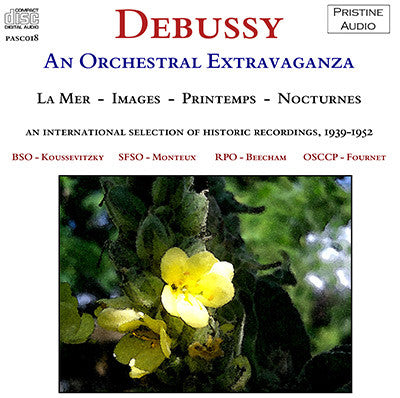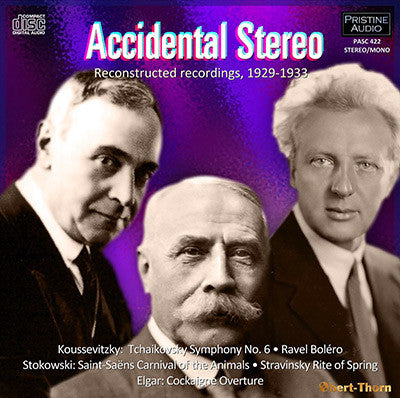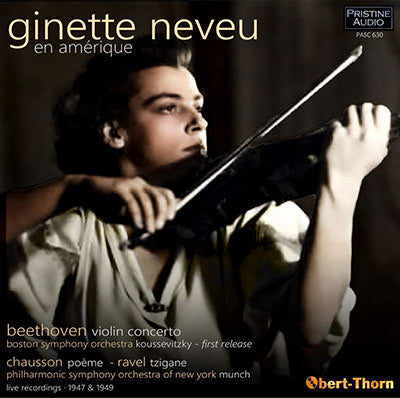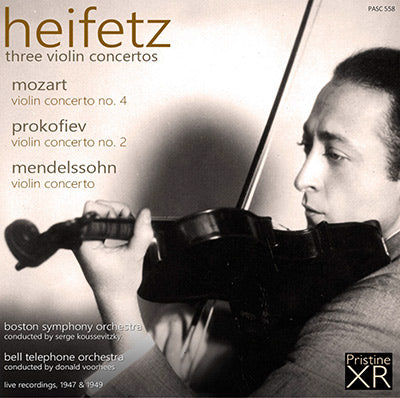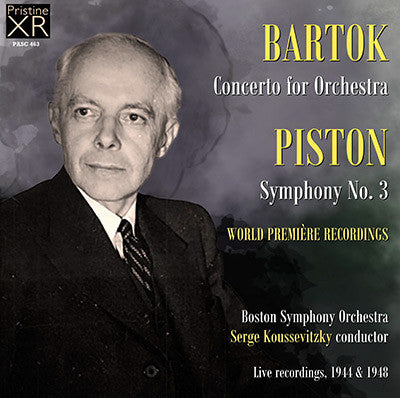Serge Koussevitzky
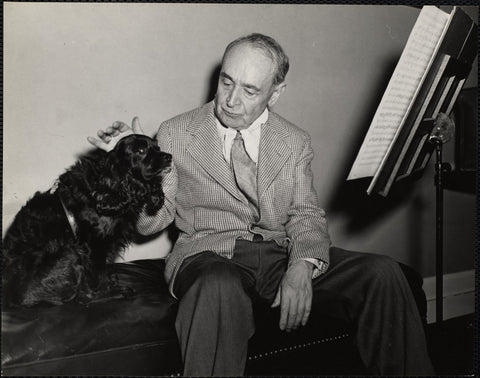
Serge Alexandrovich Koussevitzky (July 26 [O.S. July 14] 1874 – June 4, 1951) was a Russian-born conductor, composer and double-bassist, known for his long tenure as music director of the Boston Symphony Orchestra from 1924 to 1949.
Koussevitzky was a great champion of modern music, commissioning a number of works from prominent composers. During his time in Paris in the early 1920s he programmed much contemporary music, ensuring well-prepared and good quality performances. Among the well-received premieres were Honegger’s Pacific 231, George Gershwin's Second Rhapsody and Roussel’s Suite in F.
For the Boston Symphony Orchestra's 50th anniversary, he commissioned Ravel's Piano Concerto in G, Copland's Ode, Prokofiev's Symphony No. 4 (which Prokofiev later revised), Paul Hindemith's Concert Music for Strings and Brass, and Stravinsky's Symphony of Psalms, as well as works by Albert Roussel and Howard Hanson.
In 1922, Koussevitzky commissioned Maurice Ravel's arrangement of Modest Mussorgsky's 1874 suite for piano, Pictures at an Exhibition, which was premiered on 19 October that year and quickly became the most famous and celebrated orchestration of the work. Koussevitzky held the rights to this version for many years.
In 1940, Koussevitzky commissioned Randall Thompson, then a professor at the University of Virginia and director of the men's Glee club, to write a new piece for performance at Tanglewood. Koussevitzky had a large-scale festival piece in mind, but with World War II underway and France having fallen to Germany, Thompson could not find such an inspiration. Instead, he produced his unaccompanied Alleluia – with the word sung 64 times in the Russian manner – which became his most frequently performed work.
As an avid supporter of new music, Koussevitzky created the Koussevitzky Music Foundations in 1942. The basic aim of the foundations was to assist composers by commissioning new compositions and underwriting the cost of their performance. New works created with the foundations' support include: Benjamin Britten's opera Peter Grimes, Douglas Moore's opera The Ballad of Baby Doe, Béla Bartók's Concerto for Orchestra, Aaron Copland's Symphony No. 3, Henri Dutilleux's string quartet Ainsi la nuit and Olivier Messiaen's Turangalîla-Symphonie.
Following Koussevitzky's 1951 death, his widow, Olga Koussevitzky, presented double-bassist Gary Karr with his double bass, once believed to have been made in 1611 by brothers Antonio and Girolamo Amati. The instrument now bears the names of both Karr and Koussevitzky, and has been played by bassist Scott Pingel and the San Francisco Academy Orchestra.
The Tanglewood Music Center awards the Koussevitzky Prize for outstanding student conductor. It has been awarded since 1954, but unlike many prizes, it is not awarded annually. Past winners have included Seiji Ozawa (1960), Russell Peck (1966), and Michael Tilson Thomas (1969).
Serge Koussevitzky recorded with the Boston Symphony exclusively for RCA Victor, except for a live recording made for Columbia Records, the Symphony 1933 composed by Roy Harris, recorded in Carnegie Hall, New York, during a concert, using portable equipment. One quite notable early RCA Victor session in Boston's Symphony Hall in 1929 was devoted to an early recording of Ravel's Boléro, and his first sessions with the Boston orchestra of Beethoven's Pastoral Symphony and a suite from Stravinsky's Petrushka were recorded in Symphony Hall in 1927. His nephew Fabian "Sevitzky" conducted the Indianapolis Symphony during this same period, making several recordings of his own for RCA Victor.
Some of Koussevitzky's later recordings, including performances of the second suite from Prokofiev's Romeo and Juliet (1945, Symphony Hall, Boston), first symphony (1947, Carnegie Hall, New York, a session that included Mendelssohn's "Italian" Symphony), and fifth symphony (1945, Symphony Hall, Boston), were reportedly mastered on RCA's sound film optical recording process, first employed in this way with the San Francisco Symphony in March 1942.
His very last recordings, made in November 1950, on magnetic tape using RCA's proprietary RT-21 two-track, 1⁄4-inch machines at 30 inches per second, were acclaimed performances of Sibelius's Second Symphony and Grieg's "The Last Spring". Both have been re-released by RCA on CD in Taiwan. Some of Koussevitzky's performances at Tanglewood, including a very spirited Beethoven "Egmont Overture", were also filmed during the 1940s.
Several of the Boston Symphony's 78 rpm recordings with Koussevitzky were reissued on LP on the bargain RCA Camden label, originally released at US$1.98 for a 12-inch LP album when similar top-of-the-line Red Seal records were selling for US$5.98, in the early 1950s as the "Centennial Symphony Orchestra". One of the later albums featured Prokofiev's Peter and the Wolf and Richard Strauss's Till Eulenspiegel's Merry Pranks; while the orchestra was again listed as the Centennial Symphony—and the conductor not identified, the narrator, actor Richard Hale, was. Koussevitzky ultimately rerecorded the piece in Tanglewood with Eleanor Roosevelt during the summer of 1950 on magnetic tape; issued on three 45s and a 10-inch LP, it has never been reissued officially by RCA in spite of the popularity of the Camden disc with Hale. Hale was also the narrator for Arthur Fiedler's 1953 RCA Victor recording of the same music with the Boston Pops Orchestra. RCA Victor reissued several other historic orchestral recordings on its Camden label with fictitious names to avoid having them in direct competition with newer recordings by the same artists on RCA's upscale Red Seal label.

Serge Koussevitzky
Serge Alexandrovich Koussevitzky (July 26 [O.S. July 14] 1874 – June 4, 1951) was a Russian-born conductor, composer and double-bassist, known for his long tenure as music director of the Boston Symphony Orchestra from 1924 to 1949.
Koussevitzky was a great champion of modern music, commissioning a number of works from prominent composers. During his time in Paris in the early 1920s he programmed much contemporary music, ensuring wel...
SIBELIUS A Collection of Shorter Works
Recorded 1930-41
Total duration: 73:44
Featuring various orchestras conducted by:
Beecham, Heward, Kajanus, Koussevitzky, Ormandy
plus chamber music recordings featuring:
Emil Telmanyi and Louis Jensen
DEBUSSY La Mer
DEBUSSY Images I & III
DEBUSSY Printemps
DEBUSSY Nocturnes
Recorded 1939-1952
Total duration: 77:37
Boston Symphony Orchestra/Koussevitzky
San Francisco Symphony Orchestra/Monteux
Royal Philharmonic Orchestra/Beecham
Paris Conservatoire Orchestra/Fournet
TCHAIKOVSKY Symphony No. 6 in B minor, Op.74 (Pathétique)
RAVEL Boléro
SAINT-SAËNS Carnival of the Animals
STRAVINSKY The Rite of Spring
ELGAR Cockaigne Overture
Studio recordings · 1929-1933
Total duration: 74:03
Serge Koussevitzky - Boston Symphony Orchestra
Leopold Stokowski - The Philadelphia Orchestra
BEETHOVEN Violin Concerto
CHAUSSON Poème
RAVEL Tzigane
Live broadcast recordings, 1947/49
Total duration: 77:17
Ginette Neveu. violin
Boston Symphony Orchestra
conducted by Serge Koussevitzky
Philharmonic-Symphony Orchestra of New York
conducted by Charles Munch
MOZART Violin Concerto No. 4
PROKOFIEV Violin Concerto No. 2
MENDELSSOHN Violin Concerto
Live recordings, 1947/49
Total duration: 68:30
Jascha Heifetz, violin
Boston Symphony Orchestra
conducted by Serge Koussevitzky
Bell Telephone Orchestra
conducted by Donald Voorhees
PISTON Symphony No. 3
Live recordings, 1944 & 1948
Total duration: 67:34
Boston Symphony Orchestra
-
Previous
- Page 1 of 4
- Next

